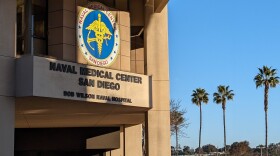Two bills up for debate and revision in the House this week aim to stop surprise medical billing — when patients are billed for services their insurance won't cover. New research reveals just how common surprise billing is after an elective surgery, like a knee replacement or hysterectomy.
Tracking data from almost 350,000 patients with a large commercial insurer, the researchers found that more than 20% were hit with an unpaid balance, according to a study released Tuesday in JAMA. The average bill was over $2,000. The researchers didn't have the actual bills received by patients, so they calculated what health care providers could bill based on claims data: unexpected out-of-network charges minus average costs insurance would pay.
"For a large percentage of the public, getting one of these bills is really going to be financially devastating," says Zack Cooper, an associate professor of public health and economics at Yale University's School of Medicine, who wasn't involved with the study. A Federal Reserve report found that nearly 40% of adults in the United States in 2018 would have trouble paying an unexpected $400 bill.
The study highlights how common surprise billing is, even in a context where consumers may have an illusion of control over what they will have to pay. Surprise bills are common after emergency care or nonsurgical hospital stays, when patients may not be able to choose health care providers covered by their insurance. (Twenty percent of inpatient admissions from the emergency department likely led to a surprise bill, a Health Affairs study found.) For elective surgeries, patients often have time to select in-network providers, but it didn't appear to make a difference.
"These are patients that actually choose their surgeon and their hospital, so it's surprising that despite narrowing it down to people who have really done their homework, we still find the same rate [as for emergency care]," says Dr. Karan Chhabra, the lead researcher on the investigation and a resident surgeon at Brigham and Women's Hospital.
The study found that most of the surprise bills come from either anesthesiologists or surgical assistants — who are typically not chosen by patients.
Chhabra doesn't always get to see his patients after they've received bills. But his friends and colleagues have dealt with surprise bills themselves. "The surgical community had to do something about this and find out exactly how often this is going on," he says.
The study arrives during a time when Congress is debating how to address this problem. The two bills under discussion take differing approaches to resolving these outstanding payments when they're no longer placed on the shoulders of patients.
Either of the two bills would be an improvement over the status quo, Cooper says. But it's unclear what measures will really make it into law.
"The devil's obviously in the details," Chhabra says.
Surprise billing was a focus in Congress last year as well, but legislation never made it through. There's now a lot of opportunity for Congress to take action, says Jean Fuglesten Biniek, a senior researcher at the Health Care Cost Institute, a nonprofit research center focused on health care.
"It's a rare case where both parties in Congress want to get something done, and we have examples of what a bipartisan agreement might look like," she says. "Just getting that far can often be difficult in health policy. I'm hopeful that they will take action."
These new results reinforce the prevalence of the problem and align with earlier findings about surprise medical billing. A Kaiser Family Foundation analysis on data from 2017 found that about 1 in 6 patients get a surprise out-of-network bill after an emergency room visit or in-patient hospital stay.
They also paint a clearer picture of the problem. The rate of surprise billing ranges from 3% in Nebraska to 46% in Alaska. And people who bought individual insurance on the state and federal exchanges have higher than average rates of surprise billing — along with those who have at least one surgical complication, whose risk is 7 percentage points higher.
"There are particularly vulnerable people out there, that might be even sicker or might not have that much money, and those people are the ones that are getting hit even harder," Chhabra says. "Those people might be the ones that are least able to cope with these bills."
Copyright 2020 NPR. To see more, visit https://www.npr.org.






